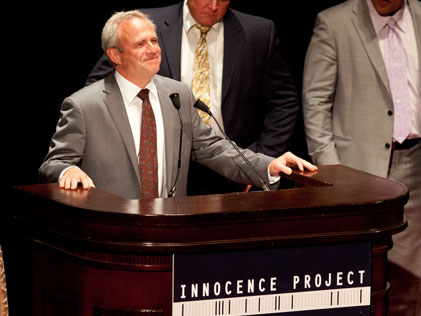Prosecutorial Accountability in the Michael Morton Case
11.13.12
In an op-ed in Monday’s
New York Times
, columnist Joe Nocera recounts
Michael Morton’s case
and the Court of Inquiry for former District Attorney who prosecuted the case.
Nocera writes:
What makes the Morton case unusual is that, thanks to the Innocence Project’s re-investigation, Ken Anderson will soon go before a Texas Court of Inquiry. If the court believes that Anderson’s alleged misconduct rises to the level of a crime, it could refer the matter to a grand jury. But the Court of Inquiry exists only in Texas, and is almost never used even there.
In truth, Anderson isn’t the only Williamson County prosecutor who faced consequences as a result of the Morton case. His successor, John Bradley, was the one who had fought for years against the DNA testing of the bandana. Seven months after Morton was set free, Bradley, who had always been a shoo-in for re-election as district attorney, was resoundingly defeated.
When I spoke to him the other day, he told me that he now believes he had been wrong to fight so hard against the DNA testing. “We shouldn’t set up barriers to the introduction of new evidence,” he said. Although it would mean more work for prosecutors, Bradley now believes that examining important new evidence is “a legitimate and acceptable cost to doing business in the criminal justice system.”
Read the
full op-ed
.
You can read more about Morton’s case in Texas Monthly’s second installment of a two-part series detailing Morton’s family life, Christine Morton’s murder, the trial and conviction, and the career of Ken Anderson.
Part One
.
Part Two
.

Leave a Reply
Thank you for visiting us. You can learn more about how we consider cases here. Please avoid sharing any personal information in the comments below and join us in making this a hate-speech free and safe space for everyone.